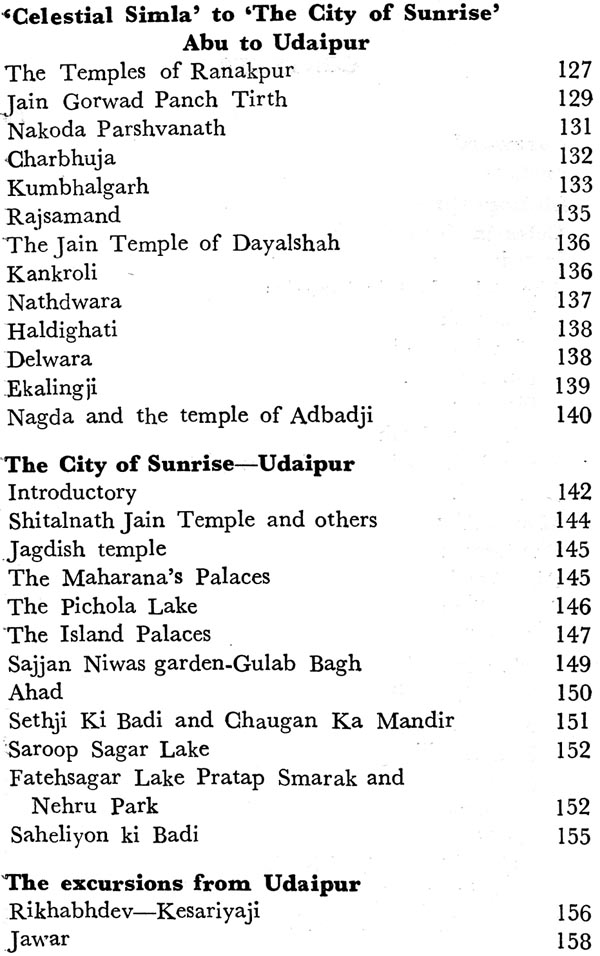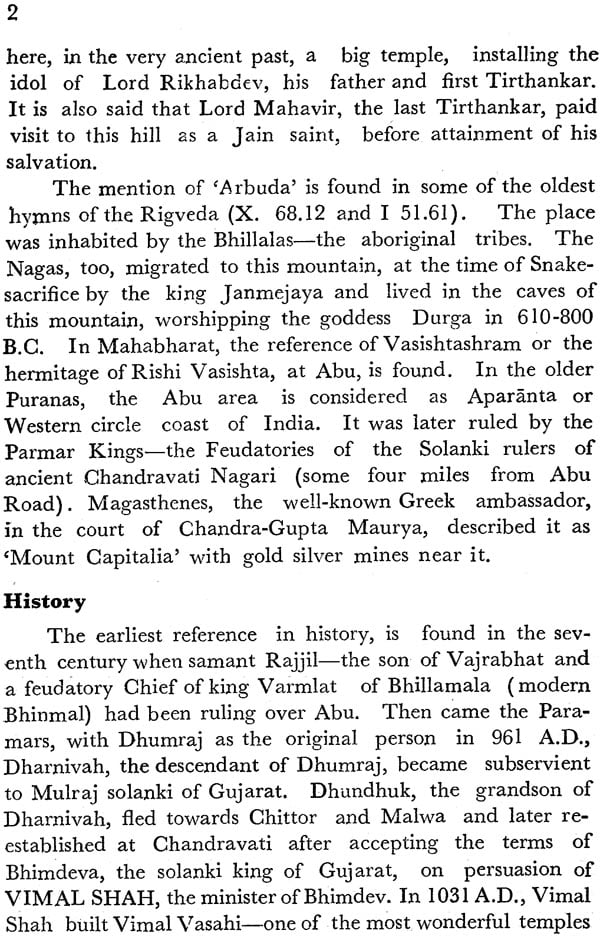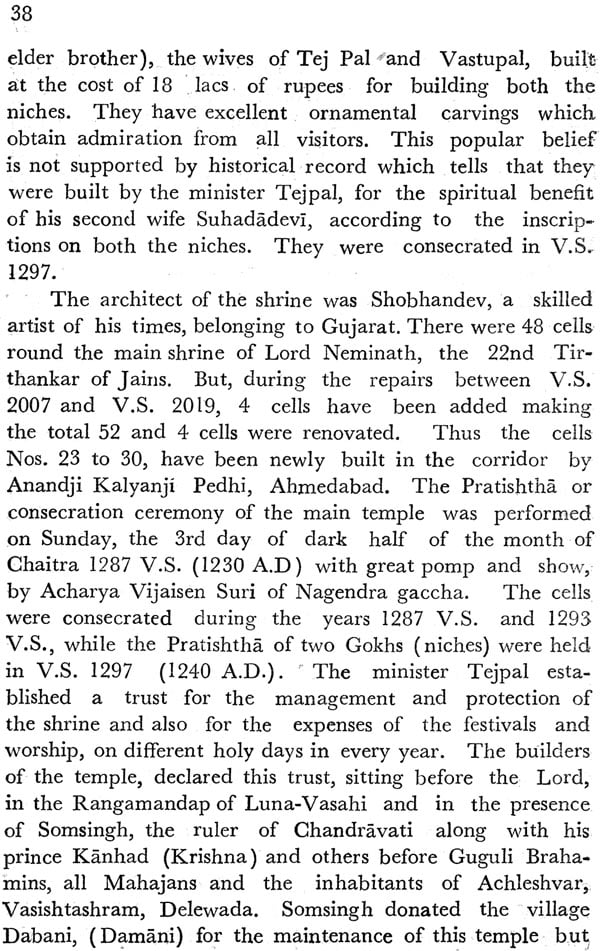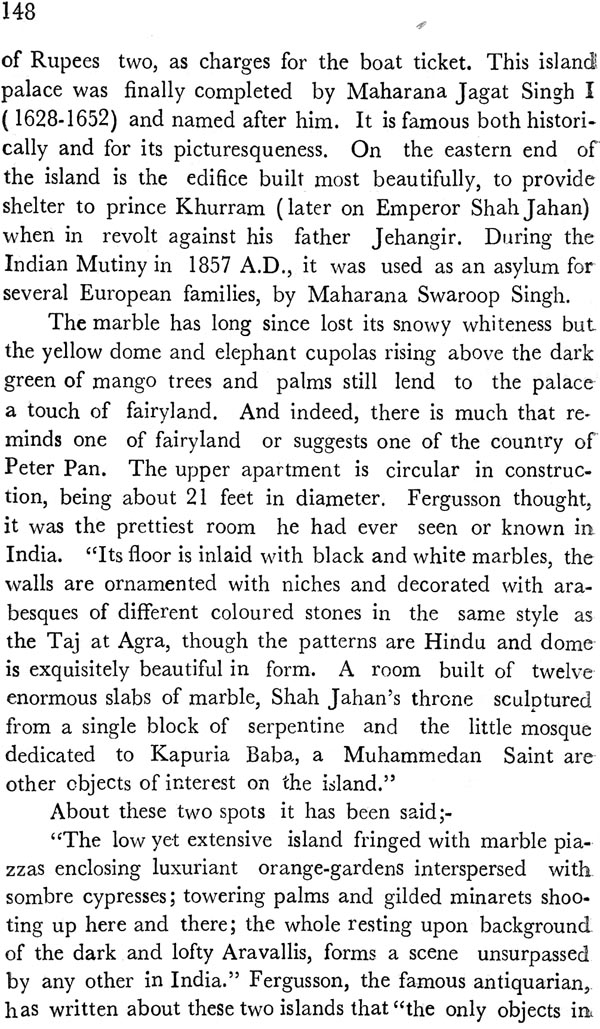
Abu to Udaipur - Celestial Simla to City of Sunrise (An Old and Rare Book)
Book Specification
| Item Code: | NAR398 |
| Author: | Jodh Singh Mehta |
| Publisher: | Motilal Banarsidass Publishers Pvt. Ltd. |
| Language: | English |
| Edition: | 1970 |
| ISBN: | 9788120829848 |
| Pages: | 242 (30 B/W Illustrations) |
| Cover: | HARDCOVER |
| Other Details | 7.50 X 5.00 inch |
| Weight | 290 gm |
Book Description
The Udaipur-Mt. Abu area in Rajasthan is rich in the monument of outstanding art and technical excellence and the places of scenic beauty unsurpassed anywhere in the world. It abounds in celestial shrines, with their ornamental carvings and idols of different kindsd of faith, Jain, Vaisnava, Saiva and Sakta.
The present work is the first of its kind that provides an elaborate account of the famous and hallowed temples and places in the area, elightening the reader on their history, geography, art and architecture.
The work is descriptive as well as historical. It contains 32 illustrations, exhaustive bibliography and a detailed index. It is of great interest and in the words of Dr. D. S. Kothari "would add very much to the enjoyment appreciation and understanding of visitors and tourists going to Rajasthan."
Shri Jodh Singh Mehta, the unassuming, careful and scholarly author of this publication has placed us under his debt by providing a splendid account of the famous and hallowed temples in the Udaipur—Mt. Abu area, and also of other monuments of outstanding art and technical excellence and places of scenic beauty unsurpassed anywhere. The book is fascinating and eminently readable. It would be of value to those interested in places of worship and historic monuments and would add very much to the enjoyment, appreciation and understanding of visitors and tourists going to Rajasthan.
Mount Abu is known as 'The Olympus of India'. Between the Himalayas on the north and the Nilgiris on the South, this is the only high mountain which abounds in green shrubberies, tall trees and celestial shrines. Its natural environment attracts the visitors from far and near; its rich products and variegated medicinal plants are both famous and important. Above all, the antiquity and architectural beauty of its Delwada Jain temples, afford a big source of our country's high culture and craftsmanship.
In the vicinity of Abu and further beyond it, we come across many places of profound peace, pleasure and pilgrimage of all the important sects of India. About 200 miles east of Abu, lies Udaipur, 'The Venice of India'—a gem of Rajas-than encircled by lofty Aravalli hills and best with enchanting lovely lakes. Near about this 'City of Sunrise' is situated Jaisamand, one of the biggest artificial lakes of the World and further to the north-east is Chittorgarh—"The cradle of chivalry and culture", telling the stories of heroic deeds, performed on its sacred soil, to preserve and protect the independence of the country against the foreign invasions. Who does not know Kumbha and Pratap, Karma-shah and Bhamashah, Padmini and Meera who along with a galaxy of its brave and meritorious sons and daughters, sacrificed everything for the maintenance of faith and fidelity. In front of it, flows the river Gambhiri which has the civilisation of one lakh years, on its banks. Seven miles from it, are seen the ruins of ancient Nagari—the old re-public of India, presenting the relics of the earliest age. The notable places described in this book are rich in antiquity, art and culture. Besides this, they are of great interest to the students of History, Archaeology and Indo-logy. Moreover, many of the places bear religious significance which lend spiritual background amongst the natural surroundings. Inspired by natural and supernatural, historical and pre-historical association of this part of our country, I have attempted to write this book and named it as Abu to Udaipur—'‘Celestial Simla' to 'City of Sunrise'.
Abu, Ambaji, Ranakpur, Charbhuja, Nathdwara and Rikhabdev (Kesariyaji), are important holy places which attract a large number of persons, every year, from the different parts of our country. There are others like Chandravati, Munghthala (near Abu Road), Ahad (Udaipur). Nagda, Nagri, Chittorgarh, and even Abu which trace their origin from very old times and they are famous historically as well as for their antiquity. Abu, Udaipur and Chittorgarh, are well-renowned places for the tourists also. While visiting the celestial shrines, with their ornamental carvings, we come across so many idols of different kinds of faith, Jain, Vaishnava, Shaiva, and Shakta and also some portrait sculptures as well as bronze images which afford ample opportunity to the students of Iconography, Archaeology, Architecture and Sculpture, for further research and exploration. In the natural environment and spiritual atmosphere, stand these man-made creations which provide peace and pleasure to the tourists and travellers coming from hurly-burly life of the modern cities and towns. I have appended also the life-sketches of eminent persons, Vimal Shah and Vastupal Tej pal who had created heaven upon earth, at holy Abu, about whom many persons are ignorant. They are the historical figures who had played conspicuous part both in war and peace but they have not come into lime-light. To illuminate their lives, is to disclose the inner feelings of their hearts which invoked them to create marvellous monuments of beauty and bounty, unsurpassed by any other works of this kind.
While eulogizing the lives of these great men, we should not forget about the architects and artists who culled out such heavenly abodes, upon the earth with the aid of their chisel from marble and stone. The lives of Sutradhar Kirtidhar of a village near Badnagar (Gujarat), Shabhan Dev of Sompura, and Deepa Shilpi of Nath School of Sculpture, Chittorgarh who constructed Vimal Vasahi, Luna Vasahi and Ranakpur temples, are in dark. At present time also, there are a few Sompura Shilpis, the chief among them being Shri Amritlal Moolchand Trivedi, who have renovated and repaired some parts of Delwada Jain temples who have exhibited skilful craftsmanship. The art of metal-casting, was prevalent, in Rajasthan and Gujarat, during the mediaeval period and we find the names of Sutradhar Lumbu, Lampu of Dungerpur (V.S.1518), Sutradhar Deva (Sutar of Mehsana North—Gujarat V.S.1525 ) and Sutradhar Haridas who had tasted beautiful bronze images of Chaumuk temple Achalgarh and Pittalhar temple, Delwala. It becomes, therefore, imperative upon us, to find out the material for drawing out the pen-pictures of these artists and skilmen who have created such lovely and magnificent masterpieces of art and crafts, out of marble and metal.
**Contents and Sample Pages**














